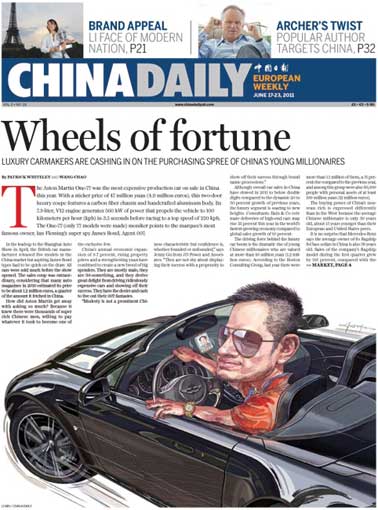Op-Ed Contributors
Debate: SCO
Updated: 2011-06-13 08:54
(China Daily)
Scholars discuss the different aspects of the Shanghai Cooperation Organization and highlight the areas it needs to focus on to enhance the security and prosperity of its members.
Sun Zhuangzhi and Zhang Ning
Mutual dependence key to better future
Economic cooperation has laid a solid foundation for multilateral cooperation among member countries of the Shanghai Cooperation Organization (SCO). In the past decade, the SCO has made great progress in economic cooperation. China's trade with other SCO member countries (Russia, Kazakhstan, Kyrgyzstan, Tajikistan and Uzbekistan) reached $86.8 billion last year, an increase of more than 7.2 times from 2001, and despite the global financial crisis it was $83.96 billion in 2009.
|
||||
First, multilateral economic cooperation requires unanimous agreement among all sides on cooperation rules so that they can see the benefits and overcome systematical and legal obstacles. But there are great differences on economic structure and legal terms and even greater differences in economic size among the SCO member states, all of which are undergoing economic and social transformation.
Second, as the dual core of the SCO, China and Russia have different expectations of the organization. As a fast-growing economic power, China is more interested in promoting economic cooperation. But for Russia, security is the main priority and it wishes the organization to take a geopolitical rival's role against NATO and the United States.
Third, almost all the SCO member states are facing a dearth of funds, because projects agreed on so far through multilateral trade talks need about $10 billion, which is difficult to come by.
Fourth, opinions on market issues differ because member states with a relatively developed economy say it is crucial to push forward trade and investment liberalization, while others prefer economic and technical collaboration to increase competitiveness but hesitate to open their markets in order to protect their industries.
Fifth, the SCO allows bilateral and multilateral talks both between member states for achieving cooperation but lacks rules to specify which of the two should become the norm and when. Bilateral negotiations are more conducive to reaching an agreement but multilateral talks can better ensure common prosperity and the integrity of the SCO.
Sixth, further consultation is needed on issues such as energy, for member states' interests are different: China buys more energy resources, Russia focuses on pipeline control, Kazakhstan and Uzbekistan concentrate on strengthening energy exploration, exploitation and exports, and Kyrgyzstan and Tajikistan are keen on hydropower and electricity grid construction.
Besides taking measures to deal with the above factors, more efforts should be made to raise the level of economic interdependence within the SCO.
So far, efforts to facilitate trade and investment have been hindered by a variety of barriers like tariffs, a license-granting mechanism, foreign exchange control and other laws and regulations. Member states are endeavoring to reach a protocol to encourage and mutually protect investments from each other. Work in other areas such as facilitating legal systems, devising beneficial tariffs, coordination of highway networks and a consultation mechanism on possible product safety problems are being undertaken, too.
Multilateral economic and technical cooperation is gradually unfolding with efforts being made to prioritize energy and transportation projects and telecommunications networks.
Financial cooperation has deepened as all the member states gear up to establish a special financial account for the organization. The feasibility of an SCO development bank is under consideration, too. And efforts are being made to broaden existing cooperation mechanisms like joint ventures on wind and solar energy, and industrialization of scientific and technological achievements, and starting new cooperation frameworks for border trade in agricultural products and food safety.
The authors are researchers at SCO Research Center, Chinese Academy of Social Sciences.
E-paper

Pret-a-design
China is taking bigger strides to become a force in fashion.
Lasting Spirit
Running with the Beijingers
A twist in the tale
Specials

Mom’s the word
Italian expat struggles with learning English and experiences the joys of motherhood again.

Lenovo's challenge
Computer maker takes on iconic brand apple with range of stylish, popular products

Big win
After winning her first major title, Chinese tennis star could be marketing ace for foreign brands




